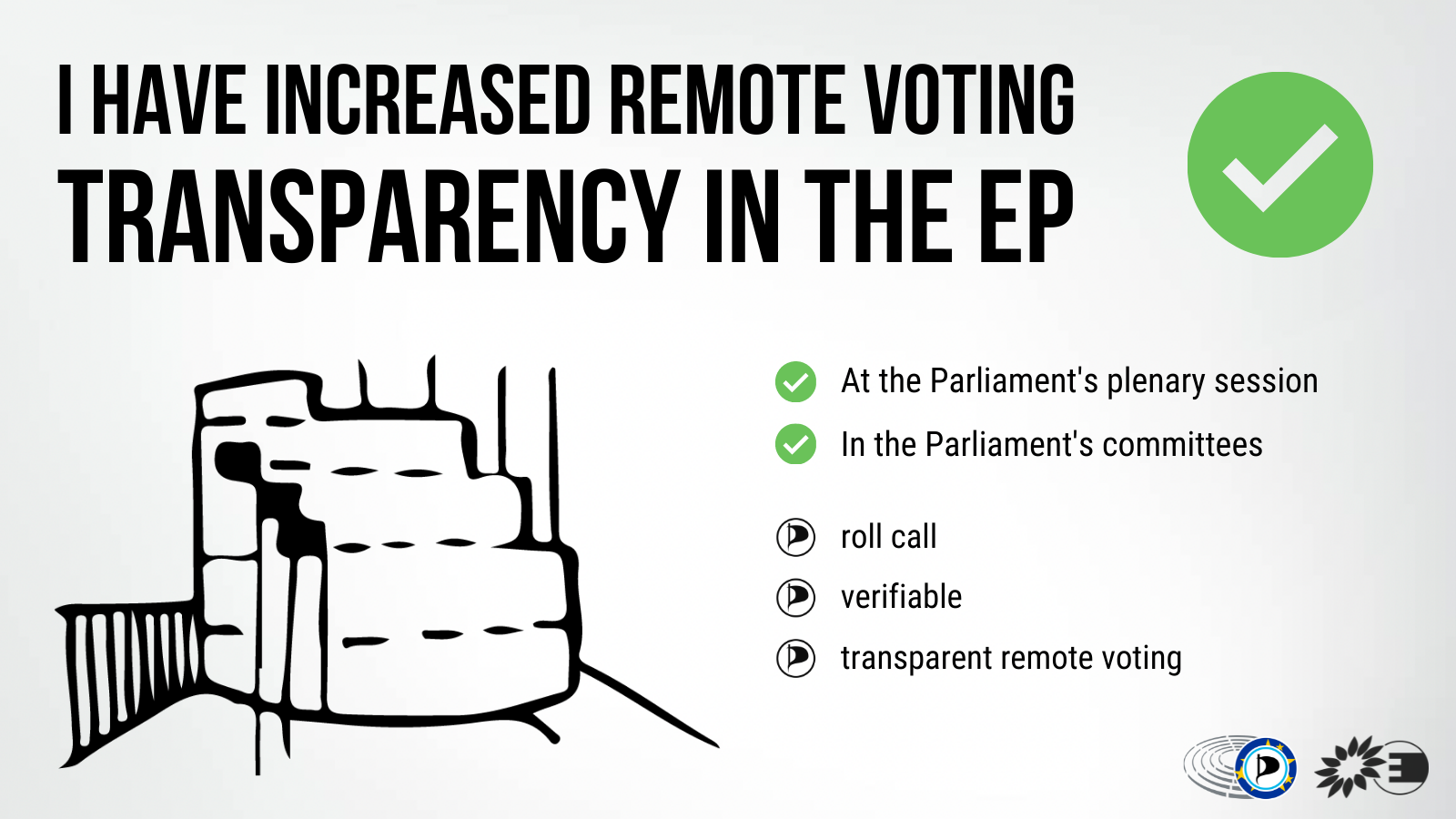How are we doing in changing the way the European Parliament works? We pursue digitization, voting by roll call, and transparency of taxpayers’ money spending.
Prior to the European Parliament elections in 2019, one of the main Pirate priorities was a free Europe that needed to be upgraded. European policy making should be more transparent and closer to the people. And since my election, I have been working hard on it.
Last year, we managed to endorse usage of Free and Open Source Software as a preferred solution in the European Parliament within the Parliament’s budgetary discharge report. This year, we increased the pressure and pushed through further amendments. That will lead to greater digitization and more transparent voting process and public budget spending. Citizens have placed their trust in our hands and have the right to know what their money is being spent on. What are the changes?
No more remote voting errors: verifiability of votes is essential
Due to the ongoing pandemic, voting has to be done remotely, in the digital space. That brings major challenges compared to physical voting: neither Members nor the public can see how the votes happen and they cannot be sure that the votes were counted correctly.
This is why—due to the pressure I created in the Bureau of the European Parliament last year—remote voting in the plenary is taken by roll call and the results are publicly available, in order to make it verifiable that votes are counted correctly. This year, after a series of negotiations, I have succeeded in convincing many Vice-Presidents of the European Parliament and Committee Chairs and gained support for voting by roll call when held remotely in Committees as well. That will prevent errors in counting from remaining undetected, or even manipulations from occurring. Another step to make the European Parliament more transparent.
Better access from the public to MEPs’ legislative work and vote
We have also succeeded in gaining support for the creation of a space on Parliament’s website where all the plenary voting records of each Member would be available. The votes would be divided per political group and nationality of Members visible and comparable.
The relevant services of the European Parliament have also been invited to study the feasibility and test the visualization of the most recent signed amendments in committees and in the plenary.
Transparent spending of European money should be as a matter of course
Members of the European Parliament have several budgets at their disposal, from which they draw funds for activities related to their mandate. For example, each Member receives 4,576 EUR per month as General Expenditure Allowance (GEA). However, currently it is not possible to verify whether the funds were spent correctly or whether someone enjoyed their vacation on the Maldives.
Unfortunately, although each Member of the European Parliament must have a separate bank account for the GEA, there is no obligation to publish expenses nor have it audited. Members don’t even have to keep the invoices and receipts. That has to change.
The European Pirates are the most transparent delegation in the European Parliament. We are the only delegation that publicly declares all funds spent under the General Expenditure Allowance by making all transactions public via a transparent bank account. We defended and obtained the support of the majority of the Members of the European Parliament to increase the pressure for a change by urging the Bureau of the European Parliament to immediately implement the previously agreed plenary’s decisions:
- mandatory return of unspent amount at the end of the mandate;
- publish expenditure by category annually;
- keep all receipts;
- admit independent auditor and publish auditor’s opinion annually;
- European Parliament to carry out 5% sample checks on the GEA expenses.
Public money, public code: Software in the European institutions should be Free and Open Source
Already in the last year’s discharge report, we pushed for the fact that Free and Open Source Software supposed to be the preferred solution. Anyway, then the pandemic came, and these solutions have been side-lined as part of the European Parliament’s Bureau priorities.
Why Free and Open Source Software (FOSS) solutions? The matter of security. The European Parliament and European institutions would retain control over their own technical systems. That is essential for limiting the risks and damages of cyberattacks that would threat their functioning. Free and Open Source Software allows for the identification and fixing of weaknesses and for designing solutions according to the European institutions’ needs and specifications.
The European Parliament should now prioritize Free and Open Source Software over proprietary software when considering new internal applications. At the same time, situations should be reported to ICT governing bodies when Open Source solutions are not chosen. For greater information security and privacy, confidential communication tools should also be based on Free and Open Source Software. Every Member of the European Parliament or their assistants should have the right to use Free and Open Source office software, if required.
Finally, publicly financed software developed for the public sector should be made publicly available under a Free and Open Source Software licence. If it is funded with public money, it should be a public code as well. Free and Open Source software gives everyone the right to use, study, share, and improve the software. This right helps to promote other fundamental freedoms, like freedom of speech, free press, and privacy.
Although the European Parliament officially approved the changes, we still have a long way ahead before we turn all of them into reality. However, I believe that better times are coming and as Vice-President of the European Parliament, I’ve been working on making these changes happen.
